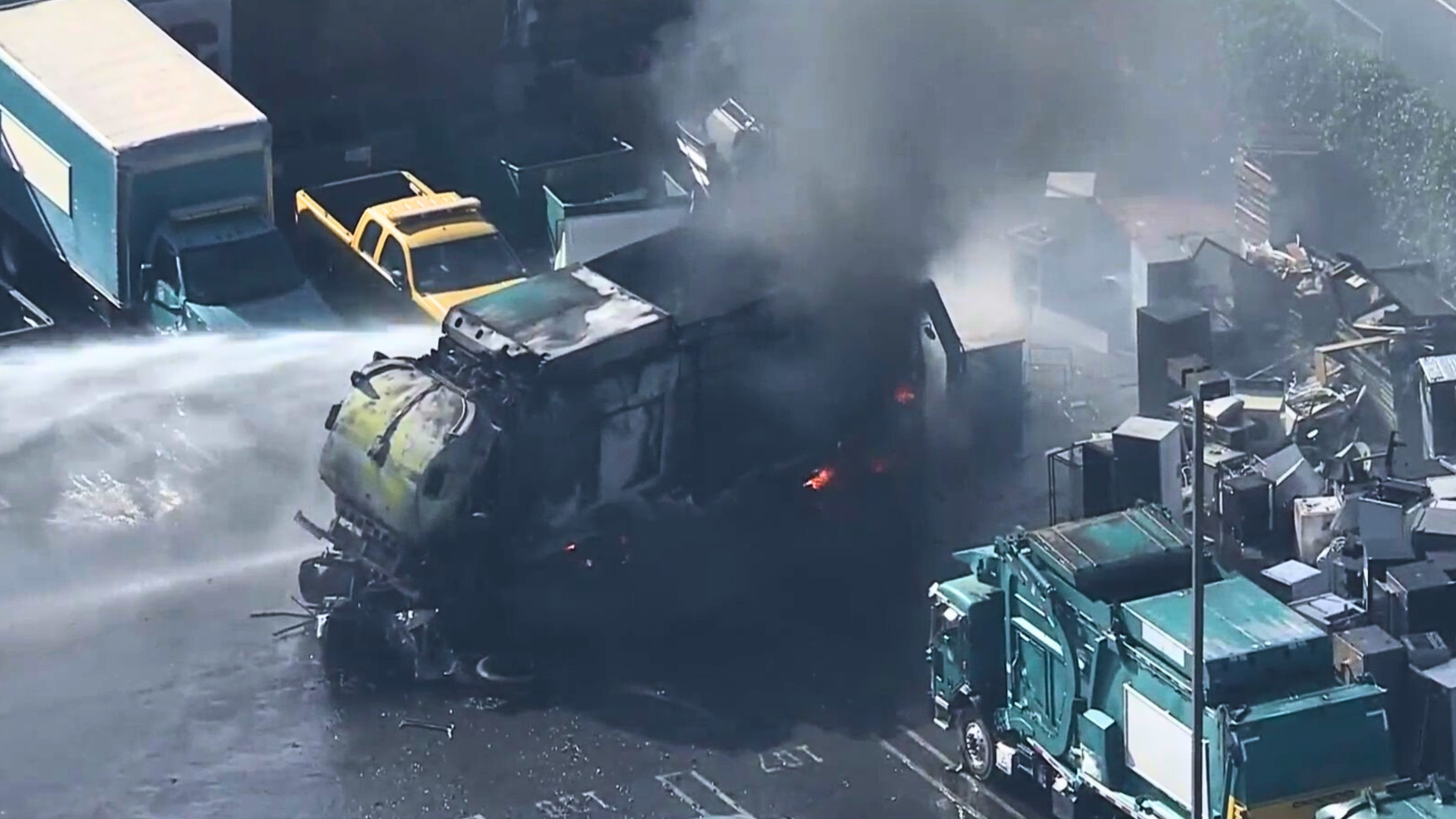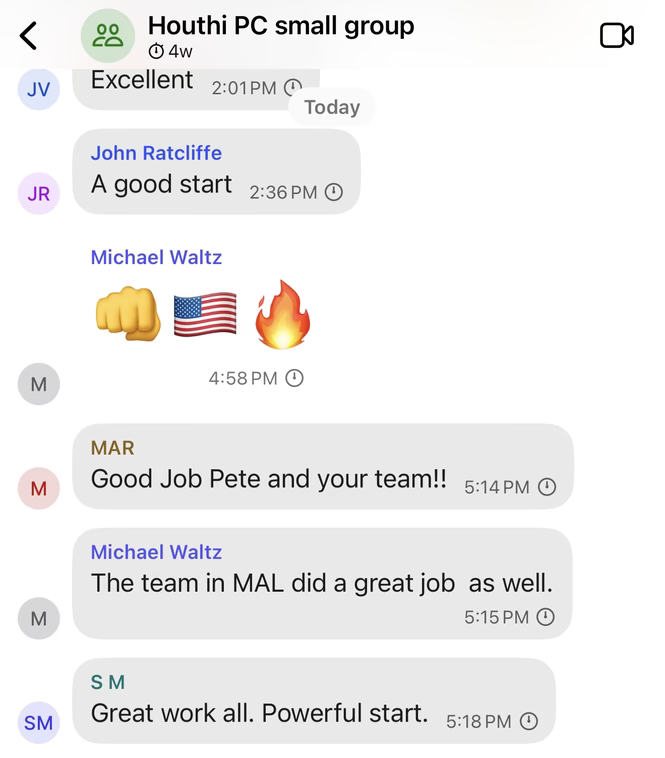
On March 11th, Jeffrey Goldberg, editor-in-chief of The Atlantic, received a connection request on Signal from someone purporting to be National Security Advisor Michael Waltz. Two days later, he was added to a chat group called "Houthi PC small group." Now, if you're thinking "PC" stands for "Personal Computer" or "Politically Correct," you'd be wrong. It stands for "Principals Committee" — essentially the highest-level national security officials in our government.
And who was in this chat? Oh, just Defense Secretary Pete Hegseth, Vice President JD Vance, Secretary of State Marco Rubio, DNI Tulsi Gabbard, and CIA Director John Ratcliffe, among others. You know, the people who are supposed to be keeping America's most sensitive secrets.
These officials weren't discussing their lunch plans or sharing memes. They were discussing actual war plans — specific targets, weapons packages, and the timing of military strikes against Houthi rebels in Yemen. Information that, if intercepted by adversaries, could have put American military personnel at risk.
And these weren't just hypothetical discussions. On March 15th, Pete Hegseth texted the group with operational details of forthcoming strikes, even specifying that the bombs would start falling at 1:45 p.m. eastern time. Sure enough, at the appointed hour, explosions were heard across Sanaa, Yemen's capital.
When Goldberg realized what was happening, he did what any responsible journalist would do — he sat in a supermarket parking lot and waited to see if the United States would actually bomb Yemen exactly when these texts said they would. Which they did! And then the officials all congratulated each other in the chat, complete with emojis of fists, American flags, and prayer hands. Very dignified.

A Cybersecurity Expert's Nightmare
This is the digital equivalent of planning a surprise party in the same room as the birthday person and being shocked when they find out. Except instead of a surprise party, it's military strikes, and instead of ruining a celebration, you're potentially endangering national security.
Signal itself is actually fairly secure as messaging apps go. It uses end-to-end encryption, minimal data collection, and is open-source. But the security of an app doesn't matter if you're accidentally inviting journalists to your war room.
Let's remember that the NSA specifically warned the White House against using personal devices and non-secure apps for sensitive communications. As one former intelligence official noted, "This happens with every administration that comes in. They don't know from this world and they don't understand the vulnerabilities".
After Goldberg published his story, the administration's response was essentially, "Oops! Anyway, everything's fine." A National Security Council spokesman confirmed the messages were authentic but insisted "there were no threats to troops or national security". They even called the thread "a demonstration of the deep and thoughtful policy coordination between senior officials".
Yes, nothing says "deep and thoughtful" like planning military operations on the same app people use to coordinate happy hour.
Former Defense Secretary Leon Panetta had a slightly different take: "Somebody needs to get fired". He pointed out that if a different journalist had been included, they could have alerted the Houthis about the impending attacks, potentially leading to retaliation against U.S. facilities.
Why This Matters
Let's be clear about something: the U.S. government has established secure systems specifically designed for communicating classified information. Senior officials have constant access to the Secret Internet Protocol Router Network (SIPR) and the Joint Worldwide Intelligence Communications System (JWICS), complete with phones and laptops designed for classified communications.
But instead, they chose to discuss war plans on a consumer app, and then accidentally added a journalist to the conversation. This isn't just a funny mistake — it's potentially criminal. As Senator Chris Coons noted, "Every single one of the government officials on this text chain have now committed a crime — even if accidentally".
This incident doesn't exist in isolation. The Trump administration has a history with classified information, from the May 2017 disclosure of intelligence to Russian officials to Trump's own handling of classified documents that led to his indictment in 2023.
When Hillary Clinton used a private email server, Trump repeatedly called for her imprisonment. But somehow, his administration texting war plans to a journalist is just an "inadvertent" error with no consequences.
This incident reveals a broader pattern of casualness about national security that should concern every American, regardless of political affiliation. Because when it comes to protecting sensitive information about military operations, we should expect our leaders to be slightly more careful than teenagers planning a weekend party.
The Cost of Silence
When our elected officials fail to hold their colleagues and the executive branch accountable for clear violations of security protocols and potentially illegal actions, they're not just failing in their duties—they're actively eroding the foundations of our democratic system. The Signal group chat debacle isn't just a case of poor judgment; it's a potential violation of multiple laws and a grave threat to national security.
Our system of government relies on more than just laws—it depends on those in power having the courage to enforce those laws, even when it's politically inconvenient. The framers of the Constitution provided mechanisms for accountability precisely because they understood the temptations and dangers of unchecked power.
If senators and representatives choose to look the other way in the face of such blatant disregard for security protocols and potentially illegal behavior, they're not just neglecting their duties—they're sending a dangerous message that those in power are above the law. This erosion of accountability doesn't just threaten our national security; it undermines the very essence of our democracy.
The American people deserve better. They deserve representatives who will stand up for the principles they swore to uphold, who will ask the hard questions, demand answers, and ensure that no one—regardless of their position or party affiliation—is above the law.
FIN
What we've witnessed is a spectacular failure of basic operational security by the highest officials in our government. The incident raises serious questions about how the administration handles classified information and whether they truly understand the risks involved in their communications practices.
In a world where our adversaries are constantly looking for intelligence advantages, the cavalier approach demonstrated by this administration isn't just embarrassing—it's dangerous. And while we can laugh at the absurdity of it all, we shouldn't forget that these decisions have real consequences for national security and the safety of American personnel overseas.